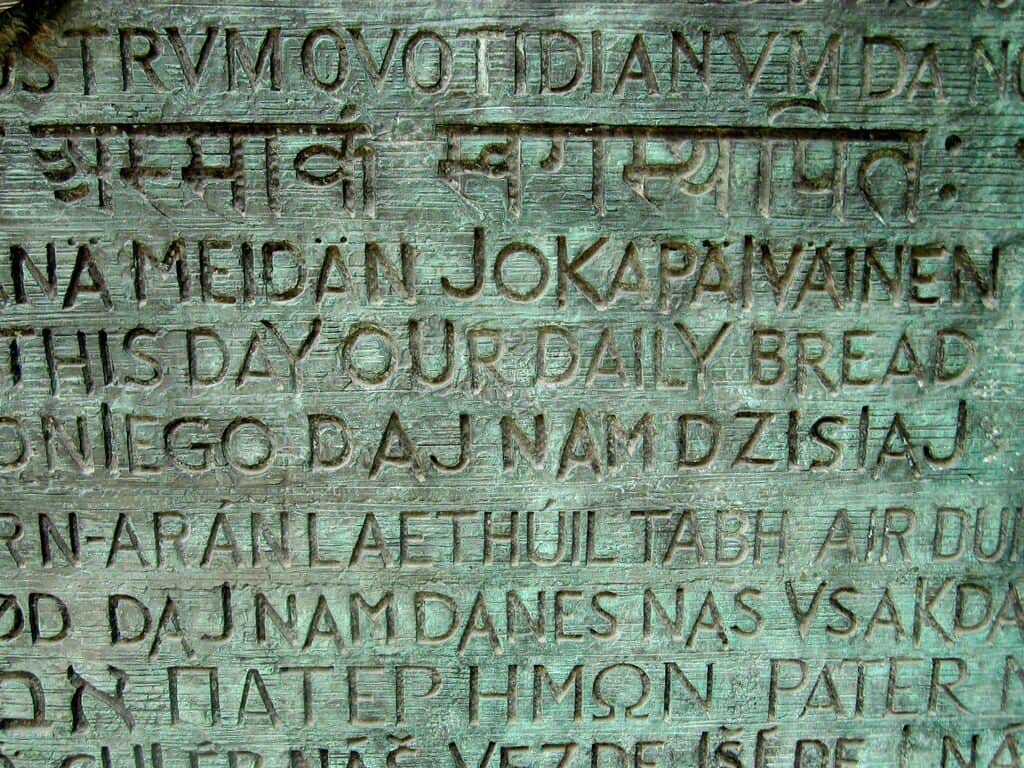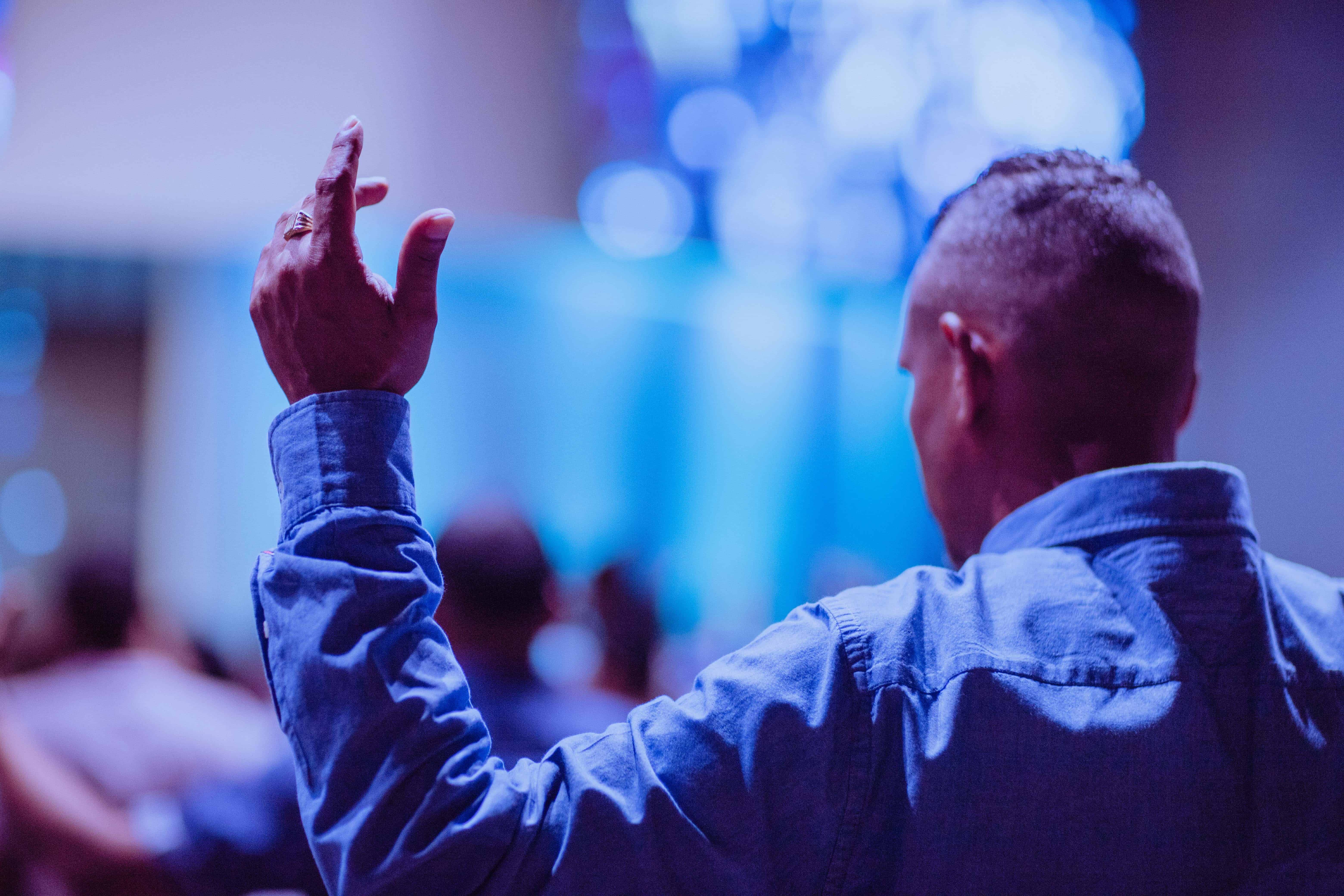Sometimes I catch myself doing the “Autopilot” Our Father: my lips are moving; sound is coming out; I might even be presiding at Mass, but because I’ve said this prayer a million times, my mind can go blank when praying the Lord’s Prayer.
I can forget that this is what Jesus taught his disciples when they asked him: “Lord, teach us to pray.” When we pray the Our Father, not only are we using the words that Christ gave us, but we are praying the way that Jesus himself prayed. That’s kind of a big deal!
In fact, it’s such a big deal that the Lord’s Prayer has often been called the “summary of the whole gospel.” That’s why it’s a shame that sometimes I recite this prayer on autopilot. Each word is the opportunity for deep reflection on who God is and how Jesus shows us the way to Him. So let’s try to take a fresh look at this prayer that we all know by heart.
What’s up with the language?
St. Ignatius of Loyola encouraged people to pray to God as “one friend speaks to another.” Just one problem, Fr. Ignatius: I don’t tell a friend, “Let’s meet at ‘thy’ place” or call a colleague “who art” in Omaha.
Clearly, the language of the Our Father is a little different. It harkens back to a previous era, but for me, that’s part of the beauty. Since it’s been used over the past two millennia, it unites us with every Christian throughout history. It’s the same prayer that Peter, James, John, and Mary Magdalene prayed, not to mention Thomas Aquinas, Mother Teresa, Oscar Romero and even my own great grandparents. While personal prayer is essential for an engaged spiritual life, shared, communal prayer expands our horizons to every place and time.
Additionally, sometimes we struggle to find our own words in prayer because of exhaustion or desolation or even just a period of dryness. A rote prayer like the Our Father can be perfect in such a situation since it gives us words to pray when words don’t come easily to us.
A Fatherly revolution
We don’t start the Lord’s Prayer by saying, “Almighty God” or “Lord God,” or even just “God.” Instead, we pray, “Our Father.” The creator of the universe is not far-off and impersonal. Instead, Jesus shows us that God is as close to us as our own family members.
Because we have been praying the Our Father our entire lives, we can easily miss how radical this is. Jesus himself prayed the Psalms with great frequency, but none of the 150 Psalms begin with this exclamation of “Father.” By inviting us to address God as our Father, Jesus frames all our prayer in the context of an intimate relationship and tells us that we can speak to God with the same tenderness and honesty that we use with our closest friends.
Not just my Father
One of the most challenging parts of the Lord’s Prayer is that first little word: We don’t say my Father, but Our Father.
Don’t get me wrong, each of us is still invited to have a personal relationship with God, just as each child in a family relates to a parent in a particular way. But by praying to Our Father, we’re called to leave behind individualistic ways of thinking and overcome division by being joined to a community of faith. Christian prayer is never simply about me and Jesus. Christian prayer is always united with the whole Body of Christ.
If God is our Father, then all people are our brothers and sisters. That jerk who cut you off in traffic? That politician you cannot stand? You better believe God is their Father too.
Who knew so much was going on in one little word! What if we lived as though what we were praying was true? How different the world might look.
Live in the tension
If you have no clue how to answer a question when taking a theology test, a good guess is always some version of “already but not yet.” (The Catholic “both/and” is another great guess.) Catholic theology speaks a lot about the fact that the kingdom of God is “already” here and that the kingdom of God will come — it is “not yet.”
Already: Christ has already come and was raised from the dead, and so we pray the Our Father as Easter people. Not Yet: We also see that so many parts of our world need the light of the kingdom, and so we rightly pray for its coming.
God’s kingdom is God’s kingdom; it’s first and foremost a gift and an initiative of the Lord. But our Father invites us to participate partially in that kingdom right now, and to pray that it might become fully present soon.

Engraving on south east portal entrance” by Alastair Dunning is licensed under CC BY-NC 2.0
A Declaration of Independence
After the initial petitions about the name, kingdom, and will of the Father, the rest of the Lord’s Prayer involves begging God to give us what we need.
Some people might feel uncomfortable asking for stuff from God. Petitionary prayer can seem a little childish and maybe even selfish. Perhaps we don’t want to “annoy” God by asking for so much (as if that could actually happen).
We might even wonder if petitions are worth it. We’ve all asked for things in prayer that we did not receive, at least in the way that we expected or wanted. We might resist petitionary prayer because we don’t want to get our hopes up, only to be disappointed yet again.
But Christ explicitly tells us to pray this way — and to keep on seeking, knocking, and asking!
Each time we pray the Our Father, we ask for God to give us all that sustains us, to forgive us our sins, to guide us away from temptation, and to deliver us from evil.
Why would Christ want us to ask for what we need? By praying this way, we admit that we can’t pick ourselves up by our bootstraps. We are dependent on God. And the more we depend on God, the freer we actually become. Every time I ask God for something in prayer, I recognize that God is the one in control.
We then do our part. Asking things from God does not mean I sit on my hands. Rather, I cooperate. With God as my Father, it’s only natural that I would want to do my part in contributing to the good of the family.
Little word, big impact
“Our” is not the only sneakily significant word in the Lord’s Prayer. There’s an even smaller, even sneakier, and even more significant word: “as.” We ask God to forgive our trespasses as we forgive those who trespass against us. We’re essentially saying that we are in no position to receive the outpouring of God’s mercy unless we first forgive others. As the Catechism states, “Our petition looks to the future, but our response must come first” (2838).
This is more a homework assignment than a Get Out of Jail Free card. We have work to do. We need to forgive others and recognize that we are sinners. We ask much of God in this prayer, but our asking comes with a task.
It’s a journey
Even when we forgive others, confess our own sins, and allow ourselves to experience God’s mercy, this is not the end of the story. Far from it! There are few experiences more universal than facing temptation and evil. In our continued state of dependence, we ask God not to allow us to go down a sinful path.
God the Father is as close to us as a family member, but temptation is just around the corner. We cannot make the journey alone. We ask for help.
Ever ancient, ever new
When I’m not just going through the motions, I remember that these are not my words but the words Christ gave us. I don’t pray to “my Almighty God” but to Our Father. I become more grateful to the God who gives us so much — and so much to do. I remember my utter dependence on Our Father, and on my brothers and sisters in faith.
I’m not often filled with warm fuzzies and amazing insights when praying the Our Father. My mind goes on autopilot more often than I would like to admit. But when I slow down and let these words wash over me, the power of this prayer does break through. Through the Our Father, Jesus can once again “teach us to pray.”
//
Cover image courtesy of Luis Quintero from Pexels.


